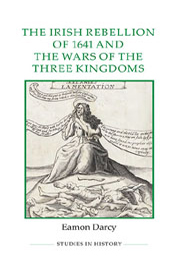Book contents
- Frontmatter
- Contents
- Acknowledgements
- Abbreviations
- Introduction
- 1 Representing violence and empire: Ireland and the wider world
- 2 Imagined violence? The outbreak of the 1641 rebellion in Ireland
- 3 Manufacturing massacre: the 1641 depositions and the Wars of the Three Kingdoms
- 4 The 1641 rebellion and violence in the New and Old Worlds
- 5 Contesting the 1641 rebellion
- Conclusion: The 1641 rebellion in its British, European and Atlantic world context
- Bibliography
- Index
Conclusion: The 1641 rebellion in its British, European and Atlantic world context
Published online by Cambridge University Press: 05 May 2013
- Frontmatter
- Contents
- Acknowledgements
- Abbreviations
- Introduction
- 1 Representing violence and empire: Ireland and the wider world
- 2 Imagined violence? The outbreak of the 1641 rebellion in Ireland
- 3 Manufacturing massacre: the 1641 depositions and the Wars of the Three Kingdoms
- 4 The 1641 rebellion and violence in the New and Old Worlds
- 5 Contesting the 1641 rebellion
- Conclusion: The 1641 rebellion in its British, European and Atlantic world context
- Bibliography
- Index
Summary
Writing in 1988, Hugh Trevor Roper, Emeritus Regius Professor of Modern History at Oxford, spoke of ‘The lost moments of history’. Had certain events not occurred, he postulated, European and global history would have taken a radically different course. He pointed to numerous examples, such as the failed Pacification of Ghent in 1576, which might have brought about ‘the historic unity of the Netherlands’. Instead, Belgium and Holland became two separate polities that ‘remain apart today’. The purpose of Roper's article was to discuss moments that led to ‘a long-term change of direction: a change, moreover which need not have occurred’. What would have happened had German forces won the First World War? What would have happened had early Christians not succeeded in converting Rome? Turning to one of his research areas, Roper delved into the nature of the English revolutions (the ‘Puritan’ Revolution in the 1640s and 1650s and the Glorious Revolution of the 1680s and 1690s) in the seventeenth century, which laid the foundations of England's famous parliamentary tradition. For Roper the pivotal moment was 1641 for it brought about lasting changes in England and Ireland: ‘The heaviest price that we paid for certain undeniable liberties was in discrimination against Roman Catholics, excluded from public life for a century and a half, and in Ireland where the repercussions of a particularly repressive policy still haunt us today.’
- Type
- Chapter
- Information
- The Irish Rebellion of 1641 and the Wars of the Three Kingdoms , pp. 168 - 178Publisher: Boydell & BrewerPrint publication year: 2013



